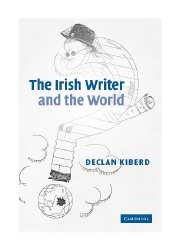Book contents
- Frontmatter
- Contents
- Acknowledgements
- A note on the text
- 1 Introduction
- 2 The fall of the Stage Irishman (1979)
- 3 Storytelling: the Gaelic tradition (1978)
- 4 Writers in quarantine? The case for Irish Studies (1979)
- 5 Synge, Yeats and bardic poetry (2002)
- 6 George Moore's Gaelic lawn party (1979)
- 7 The flowering tree: modern poetry in Irish (1989)
- 8 On national culture (2001)
- 9 White skins, black masks: Celticism and Négritude (1996)
- 10 From nationalism to liberation (1997)
- 11 The war against the past (1988)
- 12 The Elephant of Revolutionary Forgetfulness (1991)
- 13 Reinventing England (1999)
- 14 Museums and learning (2003)
- 15 Joyce's Ellmann, Ellmann's Joyce (1999)
- 16 Multiculturalism and artistic freedom: the strange death of Liberal Europe (1993)
- 17 The Celtic Tiger: a cultural history (2003)
- 18 The city in Irish culture (2002)
- 19 Strangers in their own country: multiculturalism in Ireland (2001)
- Index
1 - Introduction
Published online by Cambridge University Press: 22 September 2009
- Frontmatter
- Contents
- Acknowledgements
- A note on the text
- 1 Introduction
- 2 The fall of the Stage Irishman (1979)
- 3 Storytelling: the Gaelic tradition (1978)
- 4 Writers in quarantine? The case for Irish Studies (1979)
- 5 Synge, Yeats and bardic poetry (2002)
- 6 George Moore's Gaelic lawn party (1979)
- 7 The flowering tree: modern poetry in Irish (1989)
- 8 On national culture (2001)
- 9 White skins, black masks: Celticism and Négritude (1996)
- 10 From nationalism to liberation (1997)
- 11 The war against the past (1988)
- 12 The Elephant of Revolutionary Forgetfulness (1991)
- 13 Reinventing England (1999)
- 14 Museums and learning (2003)
- 15 Joyce's Ellmann, Ellmann's Joyce (1999)
- 16 Multiculturalism and artistic freedom: the strange death of Liberal Europe (1993)
- 17 The Celtic Tiger: a cultural history (2003)
- 18 The city in Irish culture (2002)
- 19 Strangers in their own country: multiculturalism in Ireland (2001)
- Index
Summary
To write – as to read – is to enter a sort of exile from the world around us. But to go into exile from the world around us may well be a signal to write. Although Ireland has produced many authors, it has on its own land-mass sustained less writing than one might be led to believe. Even a great national poet like Yeats managed to spend more of his life outside the country than in: and the list of artists-in-exile stretches from Congreve to Edna O'Brien. Nor was exile solely a condition of those who wrote in English. Much of the literature produced in Irish during the ‘revival’ in the early decades of the seventeenth century was composed and published in the cities of continental Europe. It is almost as if Irish writers found that they had to go out into the world in order to discover who exactly they were.
The problem faced by many was the discovery that an ‘image’ had preceded them to their first overseas encounter. There may be no essence of Irishness, any more than there is of Jewishness, but both peoples have had a common experience – that of being defined, derided and decided by others. If you want to know what an Irishman is, ask an Englishman, for the very notion of a unitary national identity, like that of a united Ireland as an administrative entity, is an English invention.
- Type
- Chapter
- Information
- The Irish Writer and the World , pp. 1 - 20Publisher: Cambridge University PressPrint publication year: 2005



